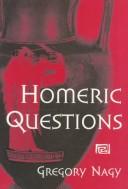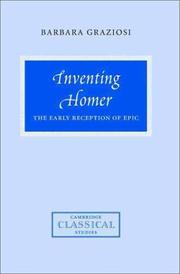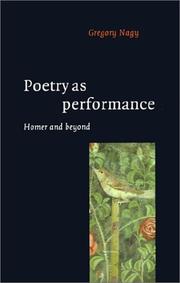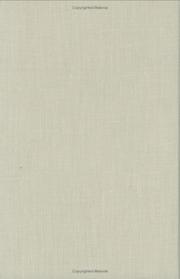| Listing 1 - 8 of 8 |
Sort by
|
Book

ISBN: 9781477316047 1477316043 1477316035 1477316051 9781477316030 Year: 2018 Publisher: Austin
Abstract | Keywords | Export | Availability | Bookmark
 Loading...
Loading...Choose an application
- Reference Manager
- EndNote
- RefWorks (Direct export to RefWorks)
Before they were written down, the poems attributed to Homer were performed orally, usually by rhapsodes (singers/reciters) who might have traveled from city to city or enjoyed a position in a wealthy household. Even after the Iliad and the Odyssey were committed to writing, rhapsodes performed the poems at festivals, often competing against each other. As they recited the epics, the rhapsodes spoke as both the narrator and the characters. These different acts--performing the poem and narrating and speaking in character within it--are seldom studied in tandem. Homer in Performance breaks new ground by bringing together all of the speakers involved in the performance of Homeric poetry: rhapsodes, narrators, and characters.The first part of the book presents a detailed history of the rhapsodic performance of Homeric epic from the Archaic to the Roman Imperial periods and explores how performers might have shaped the poems. The second part investigates the Homeric narrators and characters as speakers and illuminates their interactions. The contributors include scholars versed in epigraphy, the history of art, linguistics, and performance studies, as well as those capable of working with sources from the ancient Near East and from modern Russia. This interdisciplinary approach makes the volume useful to a spectrum of readers, from undergraduates to veteran professors, in disciplines ranging from classical studies to folklore.
E-books --- Epic poetry, Greek - History and criticism - Theory, etc. --- Performing arts - Appreciation - Greece --- Oral interpretation of poetry --- Oral tradition - Greece --- Homer - Criticism, Textual --- Epic poetry, Greek --- Performing arts --- Oral tradition --- Homer --- Oral interpretation of poetry. --- Oral tradition. --- Performanz --- Rezeption. --- Sprechtheater. --- History and criticism --- Theory, etc. --- Appreciation --- Homer. --- Homerus, --- Criticism, Textual. --- Greece.

ISBN: 0292705530 0292705549 0292796366 9780292705531 9780292705548 Year: 2003 Publisher: Austin: University of Texas press,
Abstract | Keywords | Export | Availability | Bookmark
 Loading...
Loading...Choose an application
- Reference Manager
- EndNote
- RefWorks (Direct export to RefWorks)
The Homeric Iliad and Odyssey are among the world's foremost epics. Yet, millennia after their composition, basic questions remain about them. Who was Homer—a real or an ideal poet? When were the poems composed—at a single point in time, or over centuries of composition and performance? And how were the poems committed to writing? These uncertainties have been known as The Homeric Question, and many scholars, including Gregory Nagy, have sought to solve it. In Homeric Responses, Nagy presents a series of essays that further elaborate his theories regarding the oral composition and evolution of the Homeric epics. Building on his previous work in Homeric Questions and Poetry as Performance: Homer and Beyond and responding to some of his critics, he examines such issues as the importance of performance and the interaction between audience and poet in shaping the poetry; the role of the rhapsode (the performer of the poems) in the composition and transmission of the poetry; the "irreversible mistakes" and cross-references in the Iliad and Odyssey as evidences of artistic creativity; and the Iliadic description of the shield of Achilles as a pointer to the world outside the poem, the polis of the audience.
Epic poetry, Greek --- Oral tradition --- Oral-formulaic analysis --- History and criticism --- Theory, etc. --- Homer --- Technique --- Oral-formulaic analysis. --- Technique. --- Formulaic analysis, Oral --- Folk literature --- Folklore --- Greek epic poetry --- Epic poetry, Classical --- Greek poetry --- History and criticism&delete& --- Theory, etc --- Methodology --- Homeros --- Homère --- Homerus --- Hóiméar --- Hūmīrūs --- Gomer --- Omir --- Omer --- Omero --- Ho-ma --- Homa --- Homérosz --- האמער --- הומירוס --- הומר --- הומרוס --- هومر --- هوميروس --- 荷马 --- Ὅμηρος --- Гамэр --- Hamėr --- Омир --- Homero --- 호메로스 --- Homerosŭ --- Homērs --- Homeras --- Хомер --- ホメーロス --- ホメロス --- Гомер --- Homeri --- Hema --- Pseudo-Homer --- Pseudo Omero --- Epic poetry, Greek - History and criticism - Theory, etc. --- Oral tradition - Greece --- Homer - Technique

ISBN: 0292755619 0292755627 9780292755628 0292796218 Year: 2005 Publisher: Austin: University of Texas press,
Abstract | Keywords | Export | Availability | Bookmark
 Loading...
Loading...Choose an application
- Reference Manager
- EndNote
- RefWorks (Direct export to RefWorks)
The "Homeric Question" has vexed Classicists for generations. Was the author of the Iliad and the Odyssey a single individual who created the poems at a particular moment in history? Or does the name "Homer" hide the shaping influence of the epic tradition during a long period of oral composition and transmission? In this innovative investigation, Gregory Nagy applies the insights of comparative linguistics and anthropology to offer a new historical model for understanding how, when, where, and why the Iliad and the Odyssey were ultimately preserved as written texts that could be handed down over two millennia. His model draws on the comparative evidence provided by living oral epic traditions, in which each performance of a song often involves a recomposition of the narrative. This evidence suggests that the written texts emerged from an evolutionary process in which composition, performance, and diffusion interacted to create the epics we know as the Iliad and the Odyssey. Sure to challenge orthodox views and provoke lively debate, Nagy's book will be essential reading for all students of oral traditions.
Epic poetry, Greek --- Oral tradition --- Oral-formulaic analysis. --- History and criticism --- Theory, etc. --- Homer --- Technique. --- Oral-formulaic analysis --- Technique --- Language --- Formulaic analysis, Oral --- Folk literature --- Folklore --- Methodology --- Hóiméar --- Hūmīrūs --- Homeros --- Gomer --- Omir --- Omer --- Omero --- Ho-ma --- Homa --- Homérosz --- האמער --- הומירוס --- הומר --- הומרוס --- هومر --- هوميروس --- 荷马 --- Ὅμηρος --- Гамэр --- Hamėr --- Омир --- Homère --- Homero --- 호메로스 --- Homerosŭ --- Homērs --- Homeras --- Хомер --- ホメーロス --- ホメロス --- Гомер --- Homeri --- Hema --- Pseudo-Homer --- Pseudo Omero --- Homerus --- Epic poetry, Greek - History and criticism - Theory, etc. --- Oral tradition - Greece --- Homer - Technique --- Homer - Language
Book
ISBN: 3534038649 9783534038640 Year: 1974 Volume: 27 Publisher: Darmstadt Wissenschaftliche Buchgesellschaft
Abstract | Keywords | Export | Availability | Bookmark
 Loading...
Loading...Choose an application
- Reference Manager
- EndNote
- RefWorks (Direct export to RefWorks)
Homer --- Criticism and interpretation --- History --- Critique et interprétation --- Histoire --- -Greek epic poetry --- Epic poetry, Classical --- -Hóiméar --- Hūmīrūs --- Homeros --- Gomer --- Omir --- Omer --- Omero --- Ho-ma --- Homa --- Homérosz --- האמער --- הומירוס --- הומר --- הומרוס --- هومر --- هوميروس --- 荷马 --- Ὅμηρος --- Гамэр --- Hamėr --- Омир --- Homero --- 호메로스 --- Homerosŭ --- Homērs --- Homeras --- Хомер --- ホメーロス --- ホメロス --- Гомер --- Homeri --- Hema --- Pseudo-Homer --- Pseudo Omero --- -Homer --- Epic poetry, Greek --- Greek epic poetry --- Greek poetry --- History and criticism&delete& --- Theory, etc --- Homère --- History. --- Homerus --- History and criticism --- Theory, etc. --- Hóiméar --- Epic poetry, Greek - History and criticism - Theory, etc --- Homer - Criticism and interpretation - History
Book
ISBN: 9516532861 9789516532861 Year: 1996 Volume: 109 Publisher: Helsinki : Societas scientiarum fennica = Finska vetenskaps-societeten,
Abstract | Keywords | Export | Availability | Bookmark
 Loading...
Loading...Choose an application
- Reference Manager
- EndNote
- RefWorks (Direct export to RefWorks)
Epic poetry, Greek --- History and criticism --- Theory, etc. --- -Greek epic poetry --- Epic poetry, Classical --- Greek poetry --- -Theory, etc --- Homer --- -Proclus --- -Criticism and interpretation --- Knowledge --- -Literature --- -History and criticism --- -Hóiméar --- Hūmīrūs --- Homeros --- Homerus --- Gomer --- Omir --- Omer --- Omero --- Ho-ma --- Homa --- Homérosz --- האמער --- הומירוס --- הומר --- הומרוס --- هومر --- هوميروس --- 荷马 --- Ὅμηρος --- Гамэр --- Hamėr --- Омир --- Homero --- 호메로스 --- Homerosŭ --- Homērs --- Homeras --- Хомер --- ホメーロス --- ホメロス --- Гомер --- Homeri --- Hema --- Pseudo-Homer --- Pseudo Omero --- Criticism and interpretation --- -Homer --- Homère --- Greek epic poetry --- History and criticism&delete& --- Theory, etc --- Proclus, --- Proclo, --- Proclo di Atene, --- Proclo di Costantinopoli, --- Proclo Licio Diadoco, --- Proclus Arabus, --- Proclus Diadochus --- Proclus Diadochus, --- Proclus Lycius, --- Prokl, --- Prokl Diadokh, --- Proklos, --- Proklos Diadochos, --- Proklus, --- Πρόκλος, --- Πρόκλος Πλατωνικός Διάδοχος, --- Πρόκλος Διάδοχος, --- פרוקלוס --- Criticism and interpretation. --- Literature. --- Hóiméar --- Epic poetry, Greek - History and criticism - Theory, etc. --- Proclus, philosophe grec, 410-485 --- Critique et interpretation

ISBN: 0521809665 9780521809665 Year: 2003 Publisher: Cambridge Cambridge university press
Abstract | Keywords | Export | Availability | Bookmark
 Loading...
Loading...Choose an application
- Reference Manager
- EndNote
- RefWorks (Direct export to RefWorks)
Poets, Greek --- Poètes grecs --- Poètes grecs --- Epic poetry, Greek --- Greek poets --- Greek epic poetry --- Epic poetry, Classical --- Greek poetry --- Appreciation --- History and criticism&delete& --- Theory, etc --- Biography&delete& --- History and criticism --- Homer. --- Homer --- Homeros --- Homère --- Homerus. --- Theory, etc. --- Biography --- History and criticism. --- Poésie épique grecque --- Histoire et critique --- Théorie, etc --- Biographie --- Appréciation --- Epic poetry [Greek ] --- Poets [Greek ] --- Greece --- Hóiméar --- Hūmīrūs --- Gomer --- Omir --- Omer --- Omero --- Ho-ma --- Homa --- Homérosz --- האמער --- הומירוס --- הומר --- הומרוס --- هومر --- هوميروس --- 荷马 --- Ὅμηρος --- Гамэр --- Hamėr --- Омир --- Homero --- 호메로스 --- Homerosŭ --- Homērs --- Homeras --- Хомер --- ホメーロス --- ホメロス --- Гомер --- Homeri --- Hema --- Pseudo-Homer --- Pseudo Omero --- Homerus --- Epic poetry, Greek - History and criticism - Theory, etc. --- Poets, Greek - Biography - History and criticism. --- Epic poetry, Greek - Appreciation - Greece.

ISBN: 0521551358 0521558484 9780521558488 Year: 1996 Publisher: Cambridge: Cambridge university press,
Abstract | Keywords | Export | Availability | Bookmark
 Loading...
Loading...Choose an application
- Reference Manager
- EndNote
- RefWorks (Direct export to RefWorks)
Epic poetry, Greek --- Performing arts --- Oral tradition --- Transmission of texts. --- Poésie épique grecque --- Arts du spectacle --- Tradition orale --- Transmission de textes --- History and criticism --- Theory, etc. --- Criticism, Textual. --- History. --- Histoire et critique --- Théorie, etc --- Critique textuelle --- Histoire --- Homer --- Oral interpretation of poetry --- Oral-formulaic analysis. --- History --- Poésie épique grecque --- Théorie, etc --- Oral-formulaic analysis --- Transmission of texts --- Literary transmission --- Manuscript transmission --- Textual transmission --- Criticism, Textual --- Editions --- Manuscripts --- Show business --- Arts --- Performance art --- Tradition, Oral --- Oral communication --- Folklore --- Oral history --- Poetry --- Poetry reading --- Reading poetry aloud --- Formulaic analysis, Oral --- Folk literature --- Greek epic poetry --- Epic poetry, Classical --- Greek poetry --- History and criticism&delete& --- Theory, etc --- Oral interpretation --- Methodology --- Homeros --- Homère --- Technique. --- Homerus --- Hóiméar --- Hūmīrūs --- Gomer --- Omir --- Omer --- Omero --- Ho-ma --- Homa --- Homérosz --- האמער --- הומירוס --- הומר --- הומרוס --- هومر --- هوميروس --- 荷马 --- Ὅμηρος --- Гамэр --- Hamėr --- Омир --- Homero --- 호메로스 --- Homerosŭ --- Homērs --- Homeras --- Хомер --- ホメーロス --- ホメロス --- Гомер --- Homeri --- Hema --- Pseudo-Homer --- Pseudo Omero --- Homer. --- Epic poetry, Greek Criticism, Textual --- Epic poetry, Greek - History and criticism - Theory, etc. --- Epic poetry, Greek - Criticism, Textual. --- Oral interpretation of poetry - History - To 1500. --- Performing arts - Greece - History - To 1500. --- Oral tradition - Greece - History - To 1500.

ISBN: 0674962605 0674020464 9780674020467 9780674962606 0674261887 Year: 2009 Volume: 1 Publisher: Cambridge, MA
Abstract | Keywords | Export | Availability | Bookmark
 Loading...
Loading...Choose an application
- Reference Manager
- EndNote
- RefWorks (Direct export to RefWorks)
Written Voices, Spoken Signs is a stimulating introduction to new perspectives on Homer and other traditional epics. Taking advantage of recent research on language and social exchange, the nine essays in this volume focus on performance and audience reception of oral poetry. These innovative essays by leading scholars of Homer, oral poetics, and epic invite us to rethink some key concepts for an understanding of traditional epic poetry. Egbert Bakker examines the epic performer's use of time and tense in recounting a past that is alive. Tackling the question of full-length performance of the monumental Iliad, Andrew Ford considers the extent to which the work was perceived as a coherent whole in the archaic age. John Miles Foley addresses questions about spoken signs and the process of reference in epic discourse, and Ahuvia Kahane studies rhythm as a semantic factor in the Homeric performance. Richard Martin suggests a new range of performance functions for the Homeric simile. And Gregory Nagy establishes the importance of one feature of epic language, the ellipsis. These six essays centered on Homer engage with fundamental issues that are addressed by three essays primarily concerned with medieval epic: those by Franz Bäuml on the concept of fact; by Wulf Oesterreicher on types of orality; and by Ursula Schaefer on written and spoken media. In their Introduction the editors highlight the underlying approach and viewpoints of this collaborative volume.Reviews of this book: "Despite its wide range of topics and approaches, the volume has a clear thematic focus. All contributors seek to leave behind the more formal concerns of past generations of scholars and aim instead at an understanding of orality as that which is (conceptually or actually) close, immediate, or performed. In their joint search for the new picture, classicists, linguists, and medievalists discover a range of different 'oralities'." --J. Haubold, Classical Review
Epic poetry --- Literature, Comparative --- Mythology, Greek, in literature --- Written communication --- Oral interpretation of poetry --- Oral-formulaic analysis --- Oral tradition --- History and criticism --- Theory, etc. --- Congresses. --- Greek and medieval --- Medieval and Greek --- Comparative literature --- Theory, etc --- Poésie épique --- Littérature comparée --- Poésie --- Communication écrite --- Analyse des formules orales --- Tradition orale --- Congresses --- Histoire et critique --- Théorie, etc. --- Congrès --- Grecque et médiévale --- Lecture publique --- Homer --- Criticism and interpretation --- Greek and Medieval --- Formulaic analysis, Oral --- Poetry reading --- Reading poetry aloud --- Heroic poetry --- Tradition, Oral --- Oral communication --- Folklore --- Oral history --- Folk literature --- Poetry --- Written discourse --- Written language --- Communication --- Discourse analysis --- Language and languages --- Visual communication --- Philology --- Methodology --- Oral interpretation --- Homeros --- Homère --- History and criticism&delete& --- Homerus --- Europe --- Epic poetry [Greek ] --- Epic poetry [Medieval ] --- Literature [Comparative ] --- Greece --- Oral tradition - Europe - Congresses. --- Epic poetry, Greek - History and criticism - Theory, etc. - Congresses. --- Epic poetry, Medieval - History and criticism - Theory, etc. - Congresses. --- Literature, Comparative - Greek and medieval - Congresses. --- Literature, Comparative - Medieval and Greek - Congresses. --- Oral interpretation of poetry - Congresses. --- Written communication - Greece - Congresses. --- Oral-formulaic analysis - Congresses. --- Oral tradition - Greece - Congresses. --- Hóiméar --- Hūmīrūs --- Gomer --- Omir --- Omer --- Omero --- Ho-ma --- Homa --- Homérosz --- האמער --- הומירוס --- הומר --- הומרוס --- هومر --- هوميروس --- 荷马 --- Ὅμηρος --- Гамэр --- Hamėr --- Омир --- Homero --- 호메로스 --- Homerosŭ --- Homērs --- Homeras --- Хомер --- ホメーロス --- ホメロス --- Гомер --- Homeri --- Hema --- Pseudo-Homer --- Pseudo Omero --- Epic poetry - History and criticism - Theory, etc. - Congresses. --- Mythology, Greek, in literature - Congresses.
| Listing 1 - 8 of 8 |
Sort by
|

 Search
Search Feedback
Feedback About UniCat
About UniCat  Help
Help News
News